 Petzlover
Petzlover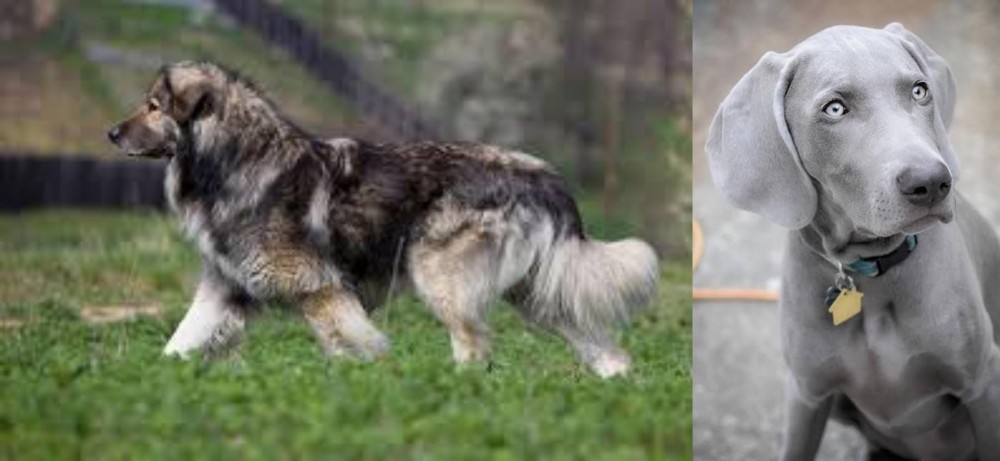 Carpatin is originated from Romania but Weimaraner is originated from Germany. Both Carpatin and Weimaraner are having almost same height. Carpatin may weigh 40 kg / 89 pounds more than Weimaraner. Both Carpatin and Weimaraner has same life span. Both Carpatin and Weimaraner has almost same litter size. Both Carpatin and Weimaraner requires Low Maintenance.
Carpatin is originated from Romania but Weimaraner is originated from Germany. Both Carpatin and Weimaraner are having almost same height. Carpatin may weigh 40 kg / 89 pounds more than Weimaraner. Both Carpatin and Weimaraner has same life span. Both Carpatin and Weimaraner has almost same litter size. Both Carpatin and Weimaraner requires Low Maintenance.
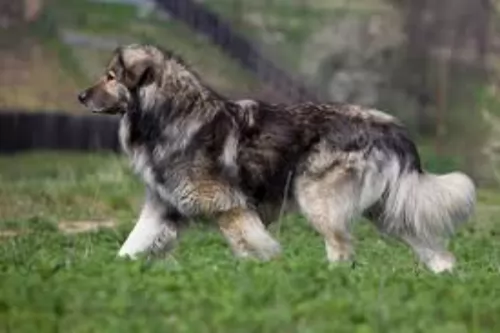 The Carpatin, known also as the Carpathian Shepherd Dog or Romanian Shepherd, is a large breed dog known for his guarding- and watch-dog abilities. Information about these dogs dates back to the 1800s, and much later, in March 1998, fans of the dog founded the Carpathian Shepherd Dogs Club.
The Carpatin, known also as the Carpathian Shepherd Dog or Romanian Shepherd, is a large breed dog known for his guarding- and watch-dog abilities. Information about these dogs dates back to the 1800s, and much later, in March 1998, fans of the dog founded the Carpathian Shepherd Dogs Club.
It is believed that the different Carpathian Shepherd Dog breeds are descendants from dogs that were developed thousands of years ago in Mesopotamia. Documentation of the origins of the dog are rare but it is thought that they are probable descendants of Lupomolossoids. However in 2005, it was finally recognized by the Federation Cynologique Internationale, and in 2006, it was recognized by the United Kennel Club. However, it is still a rare breed outside Romania.
 The Weimaraner is a German breed also know as the Grey Ghost. He was bred to hunt by royalty in the early part of the 19th century. They went after large game including the bear, boar and deer. Once these large game hunts disappeared, the breed became known for hunting small prey like rabbits, fowl and fox.
The Weimaraner is a German breed also know as the Grey Ghost. He was bred to hunt by royalty in the early part of the 19th century. They went after large game including the bear, boar and deer. Once these large game hunts disappeared, the breed became known for hunting small prey like rabbits, fowl and fox.
They are an all-purpose gun dog, hunting, chasing, tracking, pointing and retrieving. They got their name from the city of Weimar in Germany as a favorite of Karl August, the Grand Duke of Saxw-Weimar-Eisenach who hunted with the dogs. They are believed to have descended from either the St. Hubert Hound and Bloodhound, or the Chien-gris dogs.
The breed did not arrive in the United States until the 1920’s. Before that they were barely known outside the city of Weimar. By the 1950’s they were very popular in the States with President Eisenhower having one at the White House.
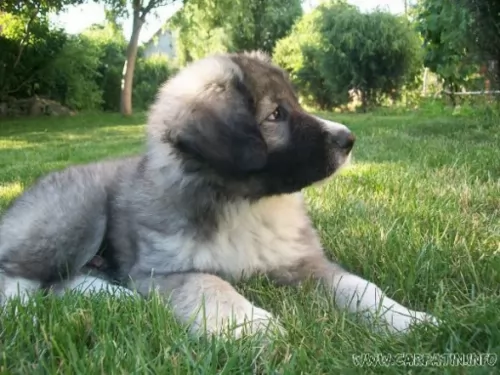 The Carpatin is a large breed dog, standing at 65 to 73cm in height and weighing between 32- and 80kg. The skull of the dog is wide and domed, the ears medium set and floppy. The neck is strong and muscled, the legs strong and straight, the chest deep.
The Carpatin is a large breed dog, standing at 65 to 73cm in height and weighing between 32- and 80kg. The skull of the dog is wide and domed, the ears medium set and floppy. The neck is strong and muscled, the legs strong and straight, the chest deep.
The tail of the Carpatin is long, bushy and high set and his coat is double layered, medium length and pale fawn in color with light grey to black shades being seen as well.
The Carpatin is patient, loving and protective. This is a strong-willed dog who is independent and fairly easy to train as he is intelligent.
It is a good idea to have him trained and socialized as this brings out the best in him. He is a patient and affectionate dog and he’ll get on well with children and tolerate other pets in the home.
They are wary of strangers and become vocal, barking and growling and taking their guard dog role seriously with strangers around.
 A very athletic and elegant breed, muscular and lean, the Weimaraner is built for stamina and speed. They are a very unique looking breed, nick named the Grey Ghost due to the appearance and coloration. The breed has a very short coat that fits like skin over his bone structure. It is smooth and hard and runs from a blue-gray to silver-gray to charcoal-blue. The skin is pink not black, the coat is thin with no undercoat.
A very athletic and elegant breed, muscular and lean, the Weimaraner is built for stamina and speed. They are a very unique looking breed, nick named the Grey Ghost due to the appearance and coloration. The breed has a very short coat that fits like skin over his bone structure. It is smooth and hard and runs from a blue-gray to silver-gray to charcoal-blue. The skin is pink not black, the coat is thin with no undercoat.
They should not be black but they can be a longhaired Weimaraner, according to US AKC Breed Standards. In the AKC standards the tail is docked. This has now been changed in standards around the world as many countries are banning tail docking. They have webbed paws and striking amber, blue-gray or gray eyes. The long haired version can only be produced when both parents carry the recessive gene
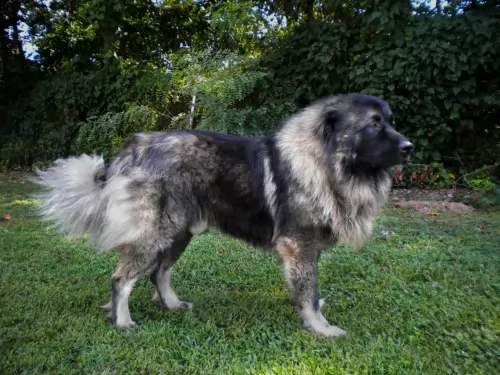 The Carpatin is a big, independent dog who loves his human family. He will guard them too and has all the intelligence and skills to be instinctively alert to danger. Territorial, he makes an excellent watchdog.
The Carpatin is a big, independent dog who loves his human family. He will guard them too and has all the intelligence and skills to be instinctively alert to danger. Territorial, he makes an excellent watchdog.
He isn’t too social around strangers, but with training and socialization he becomes more relaxed and amicable. He responds well to training, especially when he has a firm, strong handler and owner.
Used to being a herding- and working dog, he is happiest when kept busy and isn’t a dog to use essentially for guarding only as he can become aloof and aggressive. Treat him well and have him trained and socialized and you’ll have a wonderful guardian and companion.
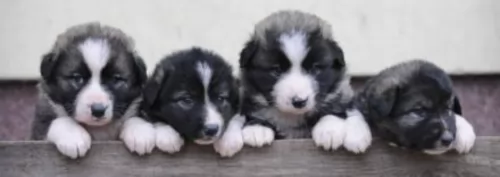 The beautiful Carpatin dog can live to be a healthy 12-14 years if you feed him nutritious foods, provide him with clean water every day, exercise him, give him a dry, warm bed and give him loads of love, attention and care.
The beautiful Carpatin dog can live to be a healthy 12-14 years if you feed him nutritious foods, provide him with clean water every day, exercise him, give him a dry, warm bed and give him loads of love, attention and care.
However every dog can become ill and with the Carpathian Shepherd Dog you certainly want to be aware of ear and eye infections, hip dysplasia and skin disorders.
 There are a few conditions and diseases that the Weimaraner is subject to but surprisingly for their size hip dysplasia is rarely one of them. There are prone to
There are a few conditions and diseases that the Weimaraner is subject to but surprisingly for their size hip dysplasia is rarely one of them. There are prone to
Bloat – Gastric torsion when the stomach twists itself and cuts off blood circulation and digestive processes. Bloat is deadly unless caught quickly.
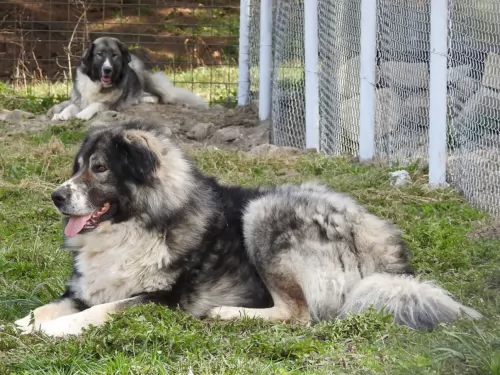 Despite his longish coat, the Carpatin is a low to moderate maintenance dog. To avoid tangles and matting, you’ll need to brush his hair at least twice a week. He won’t however require professional grooming.
Despite his longish coat, the Carpatin is a low to moderate maintenance dog. To avoid tangles and matting, you’ll need to brush his hair at least twice a week. He won’t however require professional grooming.
Dogs with floppy ears will need to have the ears checked to ensure they remain fee of moisture and wax buid-up. The ears can be easily infected when left uncleaned. The nails and teeth should also be checked. Canine toothpaste and brush can help to prevent plaque build-up which can cause gum disease and tooth decay. Not only that, dental disease can lead to other health issues in other parts of the body.
The Carpatin is a medium- to high energy level breed dog and he will therefore need a good amount of exercise to keep him healthy and content. Rope him in to your activities whether you go jogging or cycling. Put him on a leash and take him with – he’ll love it. Dogs who are allowed to be active and part of the family are simply better dogs.
Your Carpatin’s weight, age and activity levels will guide you as to what food is best for him. He needs nutritious food and if you’re unsure how to choose, your veterinarian can advise you on what to look for.
Apart from proteins, your dog needs fats, fiber, carbohydrates, minerals and vitamins. As your dog ages, he or she will go through different life stages, and you want to be sure of ensuring your dog is getting everything he needs to ward of disease and stay happy and healthy.
Make sure your 4-legged canine friend always has a bowl of fresh, cool water available to him.
 1 Feeding the puppy - Feed high quality dog food with high protein but not rich foods. Rich foods cause digestive issues and eating to fast, too soon before or after strenuous exercise do to threat of bloat. Also do not use the raised foot bowls as they hold an even great risk for bloat. Feed puppy 3-4 meals per day.
1 Feeding the puppy - Feed high quality dog food with high protein but not rich foods. Rich foods cause digestive issues and eating to fast, too soon before or after strenuous exercise do to threat of bloat. Also do not use the raised foot bowls as they hold an even great risk for bloat. Feed puppy 3-4 meals per day.
2.Feeding the adult Feed high quality dog food with high protein but not rich foods. Rich foods cause digestive issues and eating to fast, too soon before or after strenuous exercise do to threat of bloat. Also do not use the raised foot bowls as they hold an even great risk for bloat. Feed the adult twice a day.
4. Games and Exercises – This is a very athletic and energetic dog. They need activity and will become destructive without it. They develop separation anxiety very easily. They need both physical and mental stimulation. They are great at agility, course running, field trials and CAT.